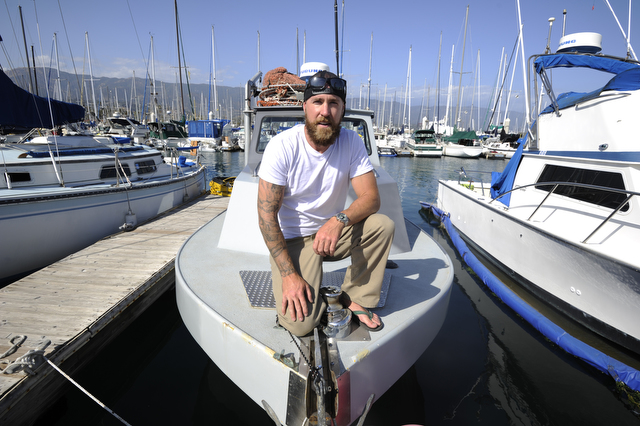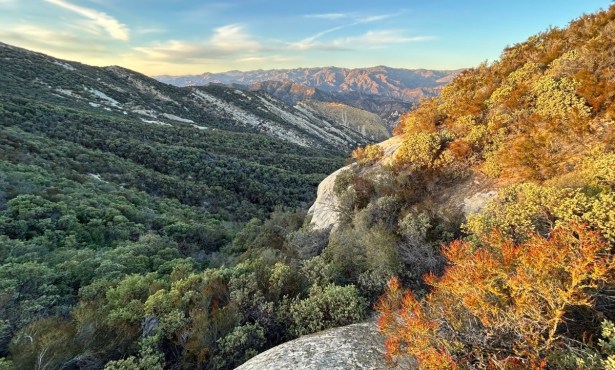Faces of the Sea: John Hoadley
Commercial Sea Urchin Fisherman Embraces Uncertainty

This is the first installment of Faces of the Sea, a new series about the people who work along Santa Barbara’s oceanfront.
Even after a childhood soaked in sea salt and six years of work as a commercial urchin diver, John Hoadley still considers himself a newbie fisherman with a lot to learn.
Fortunately, learning is an unavoidable part of the job, a natural consequence of the uncertainty tangled in the very meaning of fishing. As Hoadley sagely quips, “Sometimes you get them, sometimes you fail. That’s why it’s called fishing and not catching.”
Many days it’s too dangerous for Hoadley to get on the water and try his luck. “The weather, she’s the boss,” Hoadley says laughingly, but also in earnest. His boss can be generous, supplying weeks of glassy waters and light wind, or exceedingly stingy, offering only one or two fishing days to get him through an entire month. But it is clear that Hoadley loves his mercurial chief. While recounting the “crappy” conditions of his first day with an urchin diving crew — there was “a 10 foot swell, and wind at 25 knots” — Hoadley’s clear blue eyes light up and a smile sunrises across his face. “I was in love instantly.”
If the weather is Hoadley’s formidable, but inspirational boss, then the climate is his boss’s boss, and her appearance in the office means bad news. The red sea urchin Hoadley handpicks for a living is part of a complicated and dynamic ecosystem sensitive to changes in climate. Macrocystis, or giant kelp, is the preferred dish of the red sea urchin and dies off in the warmer waters brought by El Nino and other climate anomalies. The urchins respond to their reduced food portions by atrophying their biomass, including their gonads, which are the salable bits of the urchin and what you eat when you order uni. Unfortunately, shriveled urchin gonads are about as popular as you would imagine and provide no profits to fishermen.
Beyond the occasional lackluster harvest, uncertainty has mostly worked in Hoadley’s favor. At the time of the BP oil spill in 2010, Hoadley worked as an underwater construction diver for oilrigs, but jobs dried up after the spill and the uncertainty of his position got Hoadley thinking about alternatives. A college classmate was the son of an urchin diver and introduced Hoadley to the profession. Hoadley obtained his crewmember permit and worked for three years as a tender — urchin diver lingo for the person who tends the hookah hoses and how all urchin diver hopefuls start learning the trade. Many urchin divers never make it out of their tender phase, not due to lack of ability or desire, but because California only has 300 active sea urchin diving permits total and winning one requires luck. Hoadley won the lottery. He had luck.
At 32 years old, Hoadley belongs to a younger generation of fisher, born into a highly managed fishery and the dual role fishers now play as resource users and stewards of the marine environment. He supports the use of permits to limit fishing effort, which protects urchin from overfishing, but not necessarily the way permits are allocated, which is by lottery with anyone who has held a crewmember permit for three years getting an equal chance, regardless of the hours of work they put in or their passion for the job.
Hoadley sees other opportunities to improve the fishery as well. While the cost of living in Santa Barbara has sky-rocketed in the past 20 years, the price processors pay fishermen for product has remained steady at about $2 an urchin, adding extra financial pressure to a profession already marked by financial uncertainty. He’s hopeful that expanding direct sales to regional consumers and restaurants, as modeled by other urchin divers like Stephanie Mutz and Harry Liquornik, can improve prices divers receive for their high-quality catch.
In the past year, Hoadley has embraced a new kind of uncertainty just as important for a contemporary fisher to understand as the weather: politics. As an alternate for the Sea Urchin commission as well as the Channel Islands’ Marine Sanctuary Advisory Council, Hoadley is learning about the decision-making processes that shape his profession. It is important, he feels, to have a younger voice in the discussion because, for all the uncertainties Hoadley’s work brings him, there is no uncertainty in how he feels about his work. “I just want a chance to do this as my career,” he said. “I’m after this fishery lasting.”



